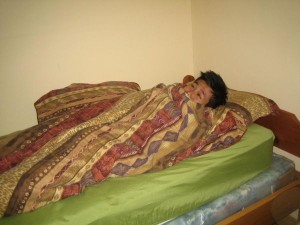Always bear in mind that dehydration is a condition in which there is inadequate fluid in the body. If the individual does not drink enough water or lost it through excessive sweating or frequent urination, it will lead to dehydration. Many do not consume the recommended 8-10 glasses of water in a day, thus many tend to be mildly dehydrated. The side effects of being dehydrated typically involve several body systems and range from minor to life-threatening. If you want to learn how to properly manage dehydration, click here.
Fatigue
Water is vital for proper cellular functioning. Inadequate intake of water will prevent all systems in the body from functioning properly. Low energy level and loss of muscle endurance and strength as well as feeling tired are all symptoms of dehydration. In most cases, lack of tears and dark circles under the eyes are indications of dehydration to observe for in children.

Dry mouth
The side effects of dehydration will start with a dry mouth and the sensation of thirst. It is important to note that the tongue and oral mucous membranes will appear dry or coated. In most cases, the mouth will also feel sticky.
Hunger
There is a sensation of hunger which is a usual side effect of dehydration. Fluids can be acquired through eating certain foods such as vegetables, fruits and soup.
Headache
Mild to moderate dehydration will lead to a headache. In most cases, a headache can be relieved by drinking several ounces of water. The thinking ability and memory of the individual will also be affected once the individual is dehydrated.
Tachycardia
A fast heart rate is an indication of moderate to severe dehydration. The heart rate will increase in an attempt to maintain the blood pressure level. Always bear in mind that fluid replacement is vital and if the individual could not consume adequate amounts of fluids, he/she should be taken to a doctor.
Diminished urine output
A reduction in the urine output is an indication of moderate to severe dehydration. Infants who produce fewer than six wet diapers in a day or children who do not urinate for eight or more hours require intervention to properly treat dehydration. It is important to encourage the child to drink fluids and if unable to drink or eat properly, a doctor should be consulted.
The urine should be clear and very light yellow in color. If the urine is dark, strong odor or there is burning sensation while urinating, it indicates dehydration.
Low blood pressure
Always bear in mind that moderate to severe dehydration will lead to low blood pressure. Low intake of fluids will lead to an increase in the circulating blood volume, thus resulting to low blood pressure. The symptoms that the individual can experience include dizziness.
Altered mental state
One of the side effects of severe dehydration is confusion and unconsciousness. An individual under this state requires emergency care. The individual suffering from severe dehydration will experience low blood pressure, fever, rapid heart rate, extreme weakness and mental confusion.
